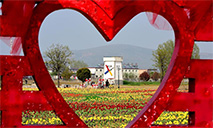Commentary: NATO should pivot away from China-bashing mania
BEIJING, April 10 (Xinhua) -- NATO Secretary General Jens Stoltenberg is finding fault with China again, nonsensically bashing it for not condemning Russia's military action in Ukraine and hyping up Beijing's threat to NATO's security.
The U.S.-led military alliance has not yet sobered up to the reality that it primarily caused the Ukraine crisis and deterioration of European security. Instead, NATO has chosen to shift the blame and play victim.
Ironically, while accusing China of "coercive diplomacy," the bloc has been busy coercing other countries to take sides. And the claim that China is spreading disinformation during the Ukraine crisis is disinformation itself.
As typical smokescreens of the West's astute political footwork to smear China, labels such as "China threat" and "coercive diplomacy" are simply nonsense.
Over the years, the U.S.-led military alliance has been a troublemaker in peacemaker's clothing, repeatedly meddling in regional and international affairs under the cloak of "human rights, democracy and peace."
Its military operations, launched directly or indirectly under the guise of "humanitarian intervention" and "anti-terrorism," have wreaked appalling havoc on Syria, Afghanistan, Libya and the former Yugoslavia, among other regions. The fallout from the operations -- innumerable civilian casualties, property loss and crisis-ridden governments -- amounted to actual humanitarian disasters.
As a relic of the Cold War, NATO, which should have disbanded long ago, has instead wantonly expanded eastward by leaps and bounds, disregarding Russia's legitimate security concerns and driving it to the corner of confrontation.
Following the outbreak of the Russia-Ukraine military conflict, NATO countries hurriedly joined Washington to obstruct a political settlement, fan the flames and magnify regional conflict, provide Ukraine with money and weapons, and pummel Russia with sweeping and indiscriminate sanctions.
NATO now reaps what it sows. An escalated conflict is corroding Europe's security and economy and widening divisions worldwide. In the end, it is the ordinary people who bear the brunt.
What the bloc has long sought is to retain hegemony and seek absolute security with no regard for the interests of others.
To this end, self-serving politicians within the alliance have been rehashing the "China-threat" hyperbole as a handy political tool to manufacture fear, issue sanctions and whip up ideological confrontation in pursuit of their own geopolitical agendas.
Such attempts to carry forward the Cold War "legacy" of bloc confrontation and zero-sum games and portray China as the next "archenemy" have imperiled world peace and security and are deeply anachronistic in today's multi-polar world, where multilateralism and globalization are the norm.
Since the outbreak of the Russia-Ukraine military conflict, China, with an objective and just attitude, has been working actively toward realizing a cessation of hostilities as soon as possible, averting a humanitarian crisis and restoring peace and stability.
Beijing takes no interest in drawing ideological lines or engaging in bloc politics to create confrontation and division. It adheres to an independent foreign policy of peace and reaches its own conclusions on an issue's merits.
The world does not need a new Cold War. NATO should discard its Cold-War mentality and work with Russia, Ukraine and other countries to build a balanced, effective and sustainable European security architecture through dialogue and negotiation.
Photos
Related Stories
- US, NATO seek united front with Asia-Pacific allies to isolate Russia, pressure China over Ukraine crisis
- AUKUS plans hypersonic weapons to confront China as US speeds up NATO, Asian allies' coordination
- 73rd anniv of NATO foundation a reminder of US long-term control of Europe’s security
- The changing attitude of NATO countries to accepting Ukraine refugees
- Experts: NATO's role worsens Ukraine crisis
Copyright © 2022 People's Daily Online. All Rights Reserved.










